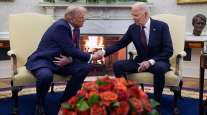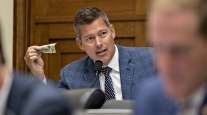Senior Reporter
Senators to Question Chao on Infrastructure, Budget

This story appears in the June 5 print edition of Transport Topics.
Secretary of Transportation Elaine Chao is headed to Capitol Hill to field questions from senators critical of the Trump administration’s 10-year infrastructure plan and proposal to reduce funding for transportation programs.
The country’s top transportation officer will face this questioning before the Senate Commerce Committee on June 7, and it will come primarily from Democrats, senior congressional aides told Transport Topics.
Most Democrats on the committee panned the White House’s call to not fund Obama-era infrastructure grants and to seek private-sector dollars to upgrade and maintain the country’s freight corridors and transit systems.
“Trump’s budget proposal does not put forward reasonable solutions to any of these problems. Instead, the Trump budget attacks the very programs that address these critical issues, making deep cuts to agencies like the [U.S.] EPA, [Housing and Urban Development], and [U.S.] DOT,” Sen. Maria Cantwell (D-Wash.), a senior member of the committee, said in a statement last month.
Democratic Sen. Tammy Duckworth of Illinois echoed her sentiment. “Instead of investing in our country’s infrastructure and manufactur- ing sector … this budget is bad for our economy,” Duckworth said.
In her first appearance on Capitol Hill since the unveiling of Trump’s budget request and infrastructure plan, Chao is scheduled to touch on concerns over air traffic control systems and other programs at the Federal Aviation Administration. The secretary’s office did not provide a copy of her prepared remarks by press time.
Under the $4.1 trillion budget request, the U.S. Department of Transportation would receive $16.2 billion for discretionary spending, 12.4% below the enacted fiscal 2017 level. Proposed funding for the Federal Motor Carrier Safety Administration would be $657.8 million. That would include $283 million for motor carrier safety and operations programs and $374.8 million for motor carrier safety grants, which is higher than the enacted fiscal 2017 level.
A $1 trillion, 10-year infrastructure funding proposal that was made part of the budget request would be propped up by $200 billion in federal spending to incentivize private- sector investments. Relying on private backers to pay for large-scale infrastructure projects has been rejected by lawmakers from rural states, such as Commerce Committee Chairman John Thune (R-S.D.). Rural highways lack the requisite traffic volume for viable tolling facilities.
“Despite ongoing interest, however, [public-private partnerships] currently account for only a small share of highway projects, partly because many projects do not make financial sense for private-sector investment,” Thune said at a hearing in March. His committee has jurisdiction over trucking policy. “We should be focused on what works for different areas of the country, not locked into a particular approach.”
Meanwhile, House Republican leaders began considering options for ensuring funding for the federal government for fiscal 2018. Lawmakers focused on overhauling tax policy and crafting a long-term infrastructure funding plan are uncertain there would be time to consider individual fiscal 2018 funding bills, such as the one that would keep DOT funding beyond Sept. 30.
Senior appropriator Rep. Tom Cole (R-Okla.) told reporters last month that legislation that would include the 12 funding bills, also known as an omnibus, would need to reflect Republican principles and garner backing from Democrats.
Still, Appropriations Committee Chairman Rodney Frelinghuysen (R-N.J.) emphasized a commitment for advancing funding bills for each agency separately.
“We intend to work as quickly as possible, while maintaining the highest standard of responsibility, to complete the fiscal year 2018 appropriations bills in a timely fashion,” Frelinghuysen said. “It is up to this Congress to provide needed proper funding to federal programs to maintain our national security and to uphold our common American values.”




